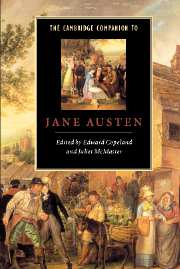Book contents
- Frontmatter
- 1 Chronology of Jane Austen's life
- 2 The professional woman writer
- 3 Northanger Abbey, Sense and Sensibility, Pride and Prejudice
- 4 Mansfield Park, Emma, Persuasion
- 5 The short fiction
- 6 The letters
- 7 Class
- 8 Money
- 9 Religion and politics
- 10 Style
- 11 Jane Austen and literary traditions
- 12 Austen cults and cultures
- 13 Further reading
- Index
6 - The letters
Published online by Cambridge University Press: 28 May 2006
- Frontmatter
- 1 Chronology of Jane Austen's life
- 2 The professional woman writer
- 3 Northanger Abbey, Sense and Sensibility, Pride and Prejudice
- 4 Mansfield Park, Emma, Persuasion
- 5 The short fiction
- 6 The letters
- 7 Class
- 8 Money
- 9 Religion and politics
- 10 Style
- 11 Jane Austen and literary traditions
- 12 Austen cults and cultures
- 13 Further reading
- Index
Summary
As she recalls her own memories of Aunt Jane to help brother James-Edward Austen-Leigh construct his Memoir of Jane Austen, Caroline Austen questions the possibility of ever representing a 'life' that already seems too obscure to recover. 'I am sure you will do justice to what there is - but I feel that it must be a difficult task to dig up the materials, so carefully have they been buried out of our sight by the past generation.' She dismisses the more obvious 'materials' at hand: 'There is nothing in those letters which I have seen that would be acceptable to the public - They were very well expressed, and they must have been very interesting to those who received them - but they detailed chiefly home and family events: and she seldom committed herself even to an opinion - so that to strangers they could be no transcript of her mind - they would not feel that they knew her any the better for having read them -'.
What I find so compelling about Caroline Austen's scepticism is its applicability to Austen studies in every generation. Readers coming to her letters usually find something 'missing' that vexes them. In his introduction to the first edition of the letters, R. W. Chapman recites what will continue to be 'a familiar defence' of the letters. They have been 'robbed of their general interest by Cassandra Austen's pious destruction of all that she supposed might possibly excite general curiosity'. By blaming Cassandra for keeping us from the 'real' Jane Austen, we are able to sustain an idea of the writer regardless of materials, or lack of materials, that occlude the portrait of the artist. We look to the letters for deep feeling, but are kept relegated to the surface of things, rewarded with 'small matters' and 'momentous minutiae'.
- Type
- Chapter
- Information
- The Cambridge Companion to Jane Austen , pp. 100 - 114Publisher: Cambridge University PressPrint publication year: 1997
- 3
- Cited by

